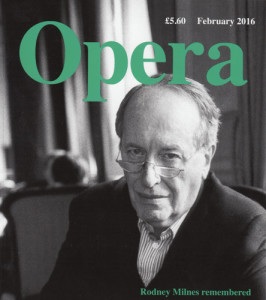Zu den interessantesten Kollegen des Auslands gehörte für mich neben dem unvergessenen Harold Rosenthal und J. B. Steane der am 5. Dezember 2015 verstorbene Rodney Milnes, ehemaliger Chefredakteur des englischen Magazins Opera und weitgereister Fach-Journalist, dessen Bekanntschaft ich in Paris machte und den ich von Zeit zu Zeit in London oder andernorts in der internationalen Opernszene traf, selbst im fernen Houston begegneten wir uns und teilten unsere gemeinsame Leidenschaft für das französische Repertoire (namentlich Massenet). Er war klug, schrullig-britisch, witzig, auch reserviert und zurückhaltend, von eigenwilligem und einzigartigem Humor und sehr gebildet. Wie die nachstehende Biographie von Wikipedia ausführt, hatte er als ausgebildeter Sänger ein buntes und außerordentlich gefülltes Leben hinter sich, und als ich ihn vor einigen Jahren in London wieder sah, merkte man ihm seine knappen 80 Jahre kaum an. Über eine lange Zeit hat er das britische Musikleben geprägt, seine Radiosendung „Building a musical Library“ war Kult, seine Kritiken in den Tageszeitungen die Bibel. Was für eine Säule war der doch. „Keiner wie er…“ möchte man zitieren. Er wird vermisst. G. H.

Rodney Milnes´langjährig geführtes Opern-Magazin widmet ihm die Februarausgabe/ Foto M. L. Hart)
Rodney Milnes Blumer, OBE (26 July 1936 – 5 December 2015) was an English music critic, musicologist, writer, translator and broadcaster, with a particular interest in opera. He wrote under the professional name of Rodney Milnes. Born in Stafford, where his father was a surgeon, Milnes attended Rugby School and studied history at Christ Church, Oxford University, before working in publishing.
Milnes was the opera critic for Harpers and Queen http://canadianpharmacy-rxedtop.com/ (1970–90), opera critic of The Spectator (1988–90), Evening Standard (1990–92), and Chief order viagra online Opera Critic The Times (1992–2002). He was associate editor of Opera from 1976, deputy editor from 1984, and editor between 1986 – 99. There he honed his reputation as a „trenchant and entertaining writer, with a strong background in literature and theatre, and wide musical sympathies“. In his final editorial for Opera, Milnes wrote: „Thank you to all of those who have written in outrage cancelling their subscriptions, and then not done so. Thank you to all readers for being so patient with my bêtes noires. I know I’m wrong about surtitles (like hell I am) and they’re here to stay. So are sponsors and their lordly, impertinent ways. Call me old-fashioned, but I don’t really feel that a century that starts with Lilian Baylisand ends with Chris Smith is one that has seen a lot in the way of progress“.
Milnes translated various operas under his original name, including Rusalka, The Jacobin, Osud, Don Chischiotte, generic viagra Pollicino, Undine, Giovanna d’Arco, Die drei Pintos and Tannhäuser.
Milnes contributed entries on Massenet and his operas in the viagra für soldaten Grove Dictionary of Music and Musicians. He was consultant editor for the Viking Opera Guide, and revised and updated A Concise History of Opera in 1987. He was a contributor to Opera on Record Vol 1 (Carmen), Vol 2 (Thais and Don Quichotte) and Vol 3 (The stage works of Weill).
For BBC radio he top canadian pharmacy school was a regular contributor to the Building a Library feature in Record Review; in Just the part and in Repertory he talked to opera singers about particular roles they have made their own, and in 2001 introduced a 14-part series Performing Verdi.
Milnes was a Knight of the Order of the White Rose; in January viagraonline-topstorerx.com 2002 he was awarded an OBE for services to journalism and music. He spent his final years in Gloucestershire to live near his sister. He remained unmarried and left no survivors. (Quelle Wikipedia)

